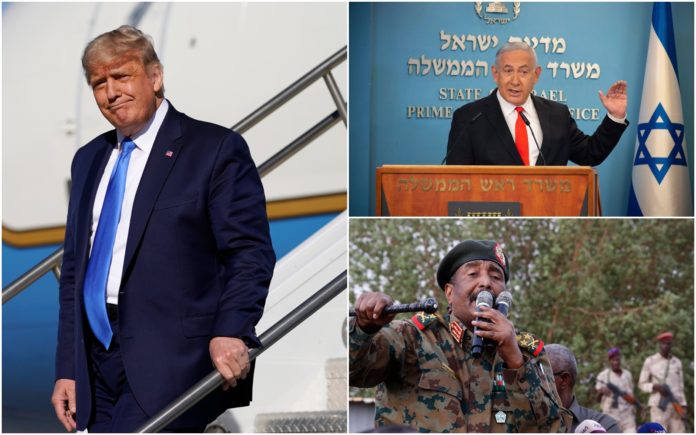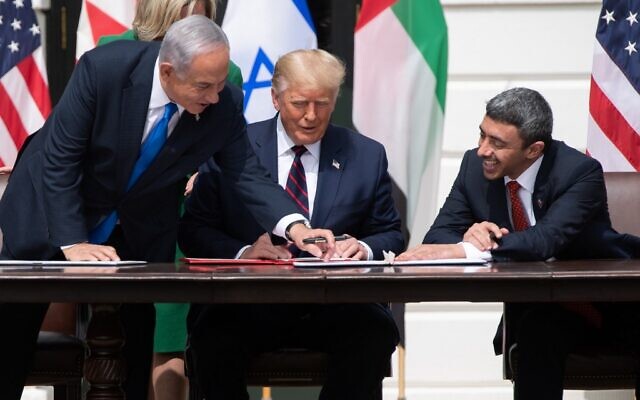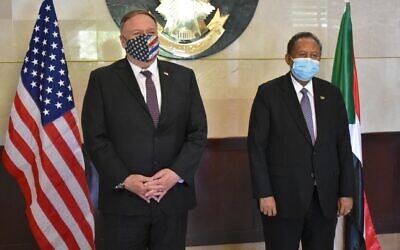

Northeast African nation, under strong pressure from Washington, would become 3rd Muslim-majority country in two months to formalize ties with Israel.
US President Donald Trump announced Monday that he would be removing Sudan from the State Department’s list of state terror sponsors in what is widely believed to be a precursor to Khartoum normalizing relations with Israel.
“GREAT news! New government of Sudan, which is making great progress, agreed to pay $335 MILLION to U.S. terror victims and families. Once deposited, I will lift Sudan from the State Sponsors of Terrorism list. At long last, JUSTICE for the American people and BIG step for Sudan!” Trump tweeted.
Trump made no mention of a decision by Sudan to normalize ties with Israel, but the US has pushed Khartoum to take that step for weeks, and it has been widely reported that Washington conditioned its decision to drop the northeast African nation from its terror blacklist on it forging official relations with the Jewish state.
Removal from the list was also seen to be contingent on Sudan paying compensation for victims of the 1998 bombings of the US embassies in Kenya and Tanzania, attacks conducted by Osama bin Laden’s al-Qaida network while bin Laden was living in Sudan.
The designation of Sudan as a state sponsor of terrorism dates back to the 1990s, when Sudan briefly hosted bin Laden and other wanted terrorists. Sudan was also believed to have served as a pipeline for Iran to supply weapons to Palestinian terrorists in the Gaza Strip.
Minutes after Trump’s post, Sudan’s Prime Minister Abdalla Hamdok tweeted back his gratitude. “Thank you so much, President Trump! We very much look forward to your official notification to Congress rescinding the designation of Sudan as a state-sponsor of terrorism, which has cost Sudan too much,” he wrote.
Sudan’s de-facto leader, Lt. Gen. Abdel Fattah al-Burhan, followed suit moments later, expressing his “deep appreciation” to the Trump administration for recognizing “the historic change that has taken place in Sudan.”
Sudan is currently ruled by a fragile transitional Sovereignty Council run by al-Burhan, who has reportedly been generally supportive of ties with Israel. His civilian counterpart, Hamdok, however, has been far more hesitant.
Al-Burhan is scheduled to hand over control of the Sovereignty Council to Hamdok in 2022. But the normalization question has reportedly driven a wedge between the two leaders, with al-Burhan increasingly frustrated by Hamdok’s insistence that the transitional government has no mandate to handle the normalization question at this time.
Mike Pompeo on August 25, 2020 (Twitter)
For weeks, Sudan was seen by US officials as the most likely candidate to follow the lead of the UAE and Bahrain, which normalized ties with Jerusalem last month.
Sudan’s presence on the terror list — along with Iran, North Korea and Syria — subjects it to crippling economic sanctions and limits the impoverished country’s access to international credit.
Details of the US-Sudan agreement were not immediately publicized, but The New York Times reported last month that Sudanese officials had also requested $3 billion to $4 billion in aid in exchange for normalizing relations with Israel.
During those negotiations, Sudan turned down an offer of $800 million in aid and investments as part of an exchange for a deal with Israel, according to The Times. Most of the sum would have been paid by the US and UAE, with Israel paying around $10 million.
Israeli officials have long expressed a wish for better relations with Khartoum, citing its importance in the region as well as its geographic location. But Sudanese officials had been rejecting the US effort to tie Khartoum’s removal from the blacklist to its normalizing ties with Israel.
Hamdok told US Secretary of State Mike Pompeo as much when the latter visited the northeast African country in August.
Sudan was the birthplace of the Arab League’s policy refusing negotiations or normalization with Israel, but in recent years it has seemingly softened its stance, moving out of Iran’s sphere of influence as it has desperately sought the removal of US sanctions as a supporter of Hamas, Hezbollah and other terror groups.
Both al-Burhan and his deputy, Mohammad Hamdan Daglo — known popularly by his nickname Hemedti — enjoy close ties with the United Arab Emirates, which recently signed a normalization agreement with Israel. Al-Burhan even commanded Sudanese brigades for the UAE in Yemen, where the Emirates have joined Saudi Arabia in executing a controversial military campaign.


The foreign ministers of the UAE and Bahrain signed the so-called Abraham Accords in a White House ceremony with Prime Minister Benjamin Netanyahu on September 15. The only Arab states Israel previously had official ties with were Egypt and Jordan.
Sudan has been technically at war with Israel for decades.
Hamdok’s transitional government came to power a year ago after Islamist president Omar al-Bashir was ousted, bringing together old rivals into a fragile coalition.
Sudan has been on the US blacklist since 1993 because of Bashir’s support for jihadists including bin Laden, who lived in the country for years in the 1990s before heading to Afghanistan.
The EU’s diplomatic chief, Josep Borrell, welcomed Trump’s announcement, tweeting, “US intention to lift the State Sponsor of Terrorism designation of #Sudan is momentous. It enhances its (Sudan’s) integration into international community and access to world economy. EU fully supports Sudan transition.”
(Times of Israel).






